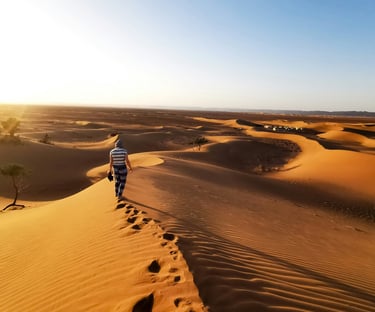
FAQ
When to visit the Sahara, what to bring with you, what to expect when you're here. All your questions answered. If there's something not covered, just ask.
In the desert
What should I wear in the desert?
Even in winter, the desert can be hot in the daytime and very cold at night, so it's best to wear light, breathable layers (cotton is ideal) you can take off or put on as required, including a lightweight but warm waterproof jacket for the evenings. Some kind of headgear is advisable - a cotton scarf or cheich (turban) is ideal for protecting you against the sun, wind and dust.
For footwear, lightweight trainers or low walking shoes are perfect, or you could try the socks and sandals combo favoured by the nomads. It may not look cool but is ideal for protecting your feet from the sun, avoiding blisters and preventing your shoes filling with sand.


What do I need to bring with me?
Bring a small backpack for carrying essentials. You may also bring an additional holdall or soft travel bag for clothes, bedding etc that will be transported by the camels.
If you’re camping wild, there are no showers or sinks in the desert, but soaking a towel with water can help you freshen up.
Don't forget toiletries - a toothbrush and toothpaste, toilet rolls and, where applicable, sanitary towels are essential, along with any other items you need for your comfort such as soap, eyewash or lip balm. If you like, you can bring wet wipes but remember they are non-biodegradable so please bring a rubbish bag with you so you can dispose of them when you return to the city.
Even in the middle of winter, in the desert you will get eight or more hours of sunshine, which can be more powerful than you think, so sun cream with a high SPF level is another essential. You will be a long way from the nearest shop or pharmacist, so make sure you bring with you any medications you need.
It’s also a good idea to bring a small first aid kit containing basic supplies such as bandages, plasters, tweezers, painkillers antiseptic cream and anti-diarrhoea medication. Finally, bring a cigarette lighter to burn any toilet paper you use.
Will I need to carry my bags while trekking?
No, the camels carry everything for you.
Where will I sleep?
You will sleep in a tent which your guide will put up for you. Also provided will be a camping mattress to sleep on and plenty of blankets to keep you warm. You're welcome to bring your own sleeping bag for extra comfort. We don’t provide pillows so you’ll need to bring your own, or just use one of the blankets.
How many people sleep in a tent?
We have tents that sleep one, two or four people so can provide the configuration you need. We will check this with you when you book.
What will the weather be like?
As you’d expect, the weather in the desert is generally warm and sunny in the daytime, but it does sometimes rain, and even in the warmer months it can get very cold at night, so you should bring suitable clothing to cover all eventualities.
Is there mobile phone reception and can I charge my phone?
In most of the places we trek you will be able to get some mobile phone reception, although it may not be very strong. There may be some places where you can’t get reception (this is the desert, after all!) There is no electricity in the desert, so please make sure you bring, and remember to charge in advance, enough power banks to keep your devices topped up.
Can I wash in the desert?
Our guides bring plenty of water which you can use to have a simple bucket wash on longer treks, but we suggest you bring wet wipes and a towel with you. On our Sahara Plus and Sahara Pro treks, you will also have the opportunity to wash in the waters of a natural spring. If you choose the serviced campsite add-on to our Sahara for Beginners tour, the site has communal bathrooms with toilets and hot showers.
What do I do about going to the toilet?
Apart from at the serviced camp, there are no toilets in the desert, so you just have to find a secluded spot behind a tree or sand dune (never a problem in the remote areas we travel in) and dig a small hole in the soft sand with your hands. It may seem strange at first but you soon get used to it. Bring a cigarette lighter with you to burn any toilet paper you use.
Are there dangerous creatures in the desert?
While there are some venomous snakes and scorpions in the Sahara, they are mostly active during the summer months, so you’re very unlikely to encounter any on one of our treks.
Will there be sandstorms in the desert?
This can happen, particularly in spring or autumn, but the sandstorms usually last no longer than a few hours. Your guides are very experienced in dealing with these situations, which are part and parcel of living in the desert, and will set up camp if possible and enable you to seek shelter until the storm has passed.
What if I have a medical emergency in the desert?
With any trip to remote areas, you are of course always further from expert medical attention than you would be in the city. However, our guides carry basic first aid kit to deal with minor medical issues, and for anything more serious can summon help to get you to the nearest doctor or hospital as quickly as possible.
Please remember, it’s vital that you take out comprehensive travel insurance, including medical cover, before your trip, and tell us in advance about any medical or mobility issues we need to know about.
What is the serviced desert camp at Erg Chigaga like?
One night at this permanent campsite is offered as an add-on to our Sahara for Beginners tour. It includes tents with actual beds, shared bathrooms with toilets and hot showers and a restaurant.
